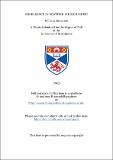Excellence in Scottish church music
Abstract
Two propositions are advanced in the present study: firstly, national, not theological, attitudes have been the main influence on Scottish church music from the earliest days to the present; secondly, the present vitality of Scottish music can be traced back to a 19th-century search for musical excellence in church services by clergy, precentors and organists. Until the 19th century Scottish church music reflected a national indifference to music in general. Neither in pre-Reformation nor post-Reformation times is there completely convincing evidence of high-quality secular musical activity before a brief, if brilliant, period in Edinburgh during the late 18th century. Improvements in the national awareness of classical music came as a result of sweeping changes the Scottish churches had to make when they confronted the scientific and philosophical revolutions of the 19th century. Despite some resistance on the part of congregations, music came to be seen as a way of emphasising confidence and solidarity in the Christian faith. Thereafter more and more expert musicians were attracted to work in Scottish churches with long-term benefits for the churches themselves and for the community in which many of then worked as teachers and administrators. With a greater awareness of the potential benefits of music making, Scottish church and school soon began to regard musical excellence not only as desirable but also as a rationale - excellence equals truth. The pursuit of excellence on the part of leading clergy and church musicians from the late 19th century to the present, which has done so much for the musical health of the nation, has recently given rise to increasing concerns about accessibility. These concerns have fundamental implications for the music of the Scottish Church.
Type
Thesis, PhD Doctor of Philosophy
Collections
Items in the St Andrews Research Repository are protected by copyright, with all rights reserved, unless otherwise indicated.

